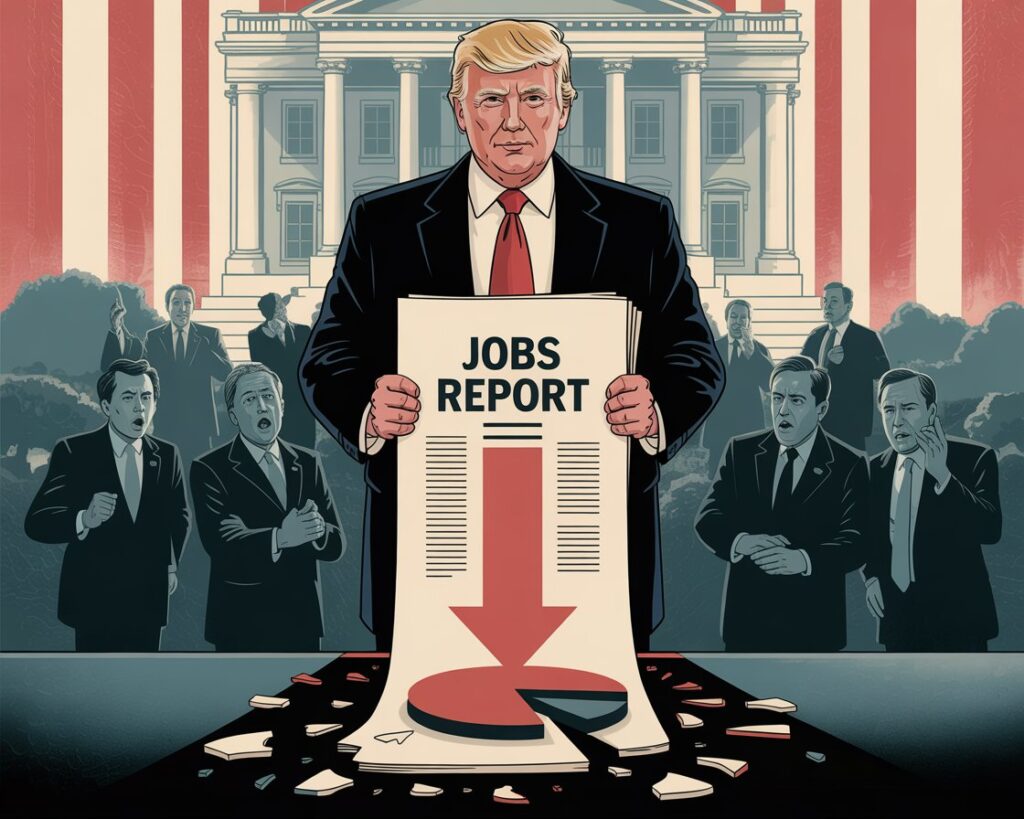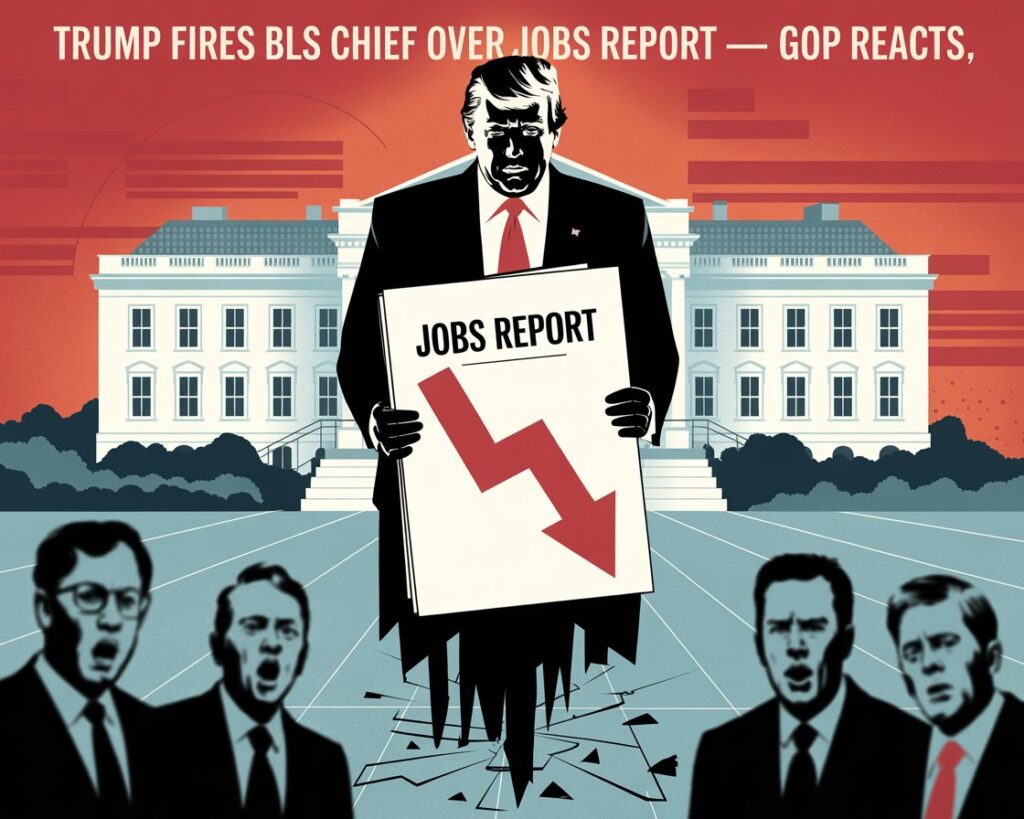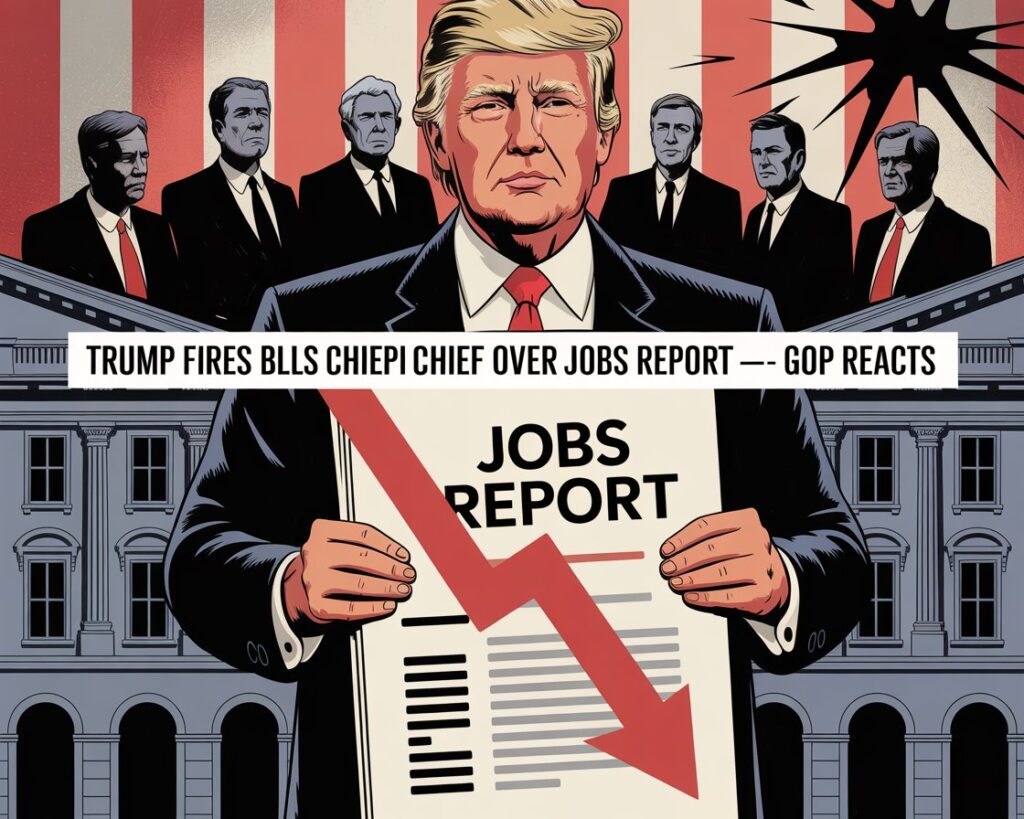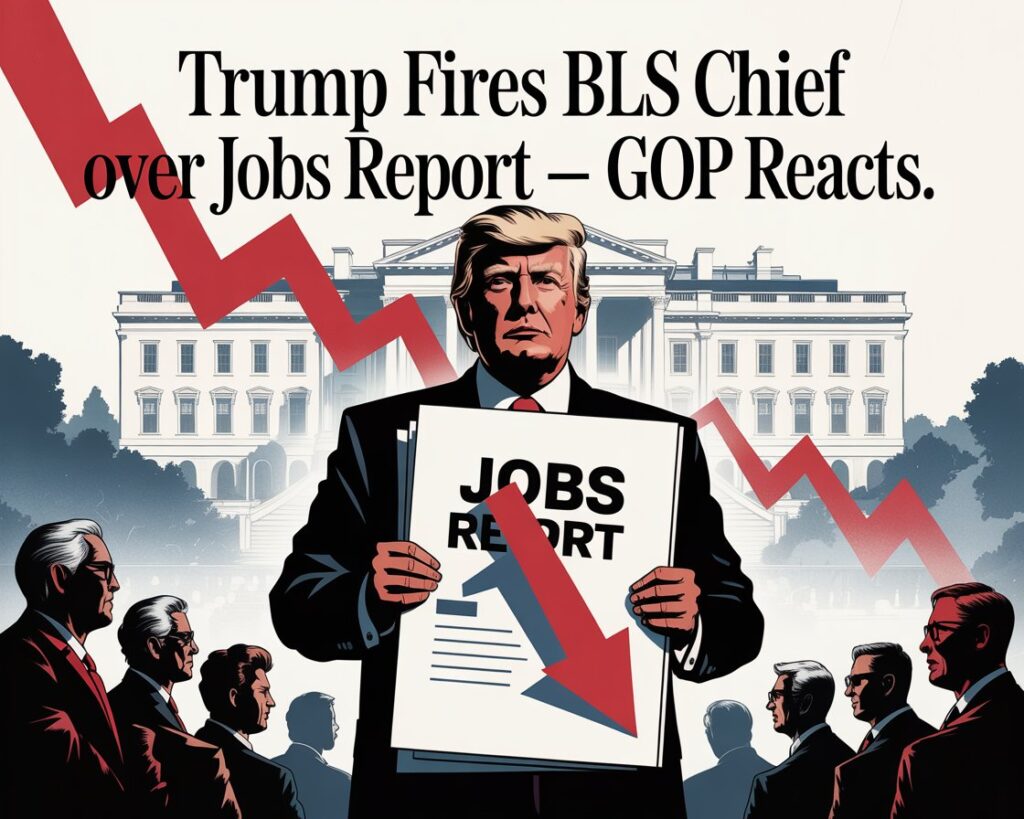Trump’s firing of BLS Commissioner Erika McEntarfer after a weak jobs report sparks backlash from GOP and Democrats. Read the full analysis, political reactions, and its impact on data credibility.

📌 Introduction
In a move that has rattled both sides of the political aisle, President Donald Trump fired Erika McEntarfer, the Commissioner of the Bureau of Labor Statistics (BLS), just hours after a disappointing July 2025 jobs report. While Trump dismissed the report as “phony,” citing unproven bias toward his political opponent, the abrupt firing has drawn fierce criticism, including from Republican senators.
This article explores the implications of this controversial decision, the political fallout, how it affects public trust in government statistics, and what it might mean for the 2025 presidential race.
📉 What Sparked the Controversy?
July Jobs Report: A Snapshot of Economic Slowdown
The July 2025 employment report, released by the BLS, showed a significant slowdown in job growth:
- Only 83,000 new jobs were added (compared to 192,000 in June).
- Unemployment rate inched up to 4.2%.
- Sectors like retail, manufacturing, and hospitality showed weaker-than-expected performance.
These numbers contradicted President Trump’s narrative of a booming post-pandemic economy.
Trump’s Response: Firing Erika McEntarfer
Hours after the report’s release, President Trump fired Erika McEntarfer, claiming without evidence that the BLS manipulated data to favor Kamala Harris, his likely rival in the general election.
“These are fake numbers, cooked up to damage our movement. We need truth, not sabotage,” Trump tweeted.

🗣 Political Reactions: Bipartisan Backlash
Republican Voices Speak Out
While Trump’s supporters remained largely silent, key GOP senators broke ranks:
Sen. Cynthia Lummis (R-WY)
“If the president is firing the statistician because he doesn’t like the numbers, then that’s a problem.”
Sen. Thom Tillis (R-NC)
“If she was fired just because someone didn’t like the numbers, they ought to grow up.”
Tillis, who recently announced he wouldn’t seek reelection, has been a vocal Trump critic post his vote against the “Big Beautiful Bill.”
Sen. Rand Paul (R-KY)
“You can’t really make the numbers different by firing the people doing the counting.”
Sen. Lisa Murkowski (R-AK)
“I can’t trust the job numbers — and that’s the problem. And when you fire people, it makes people trust them even less.”
Democratic Leaders React Strongly
Sen. Chuck Schumer (D-NY)
“This is not what democracy looks like. It’s what authoritarian leaders do.”
Sen. Bernie Sanders (I-VT)
“When leadership only accepts good news, we lose our ability to solve real problems.”
Sen. Brian Schatz (D-HI)
“This is the stuff of fascist dictatorships.”
📊 What Does the Bureau of Labor Statistics Do?
The Bureau of Labor Statistics is a nonpartisan, professional agency responsible for:
- Measuring employment and unemployment rates
- Tracking wages, productivity, and inflation
- Producing reports used by Congress, the Federal Reserve, and private sector decision-makers
Why Independence Matters
BLS is designed to be autonomous to prevent political interference. Its methodology is transparent, peer-reviewed, and updated monthly for accuracy.

⚖️ Implications of Politicizing Economic Data
1. Erosion of Public Trust
When a leader dismisses unfavorable data as biased or fires the data producers, public trust deteriorates.
Key consequences:
- Businesses may question job market data
- Investors may lose confidence in U.S. economic integrity
- Policymaking becomes reactive, not data-driven
2. Global Perception
International markets observe U.S. labor trends closely. Undermining the BLS risks damaging America’s credibility as a transparent, rules-based economy.
3. Legal & Institutional Concerns
While presidents can remove agency heads, this precedent may raise constitutional questions if it’s proven that the firing was retaliatory or politically motivated.
🧠 Expert Opinions and Statements
William Beach (Former BLS Commissioner, Appointed by Trump)
Called McEntarfer’s firing:
“Totally groundless… a dangerous precedent that undermines the statistical mission of the Bureau.”
Friends of the BLS (Independent Watchdog Group)
“The BLS uses the same proven, transparent, and reliable process every month. Its design avoids opportunities for political interference.”
🏛 What’s Next for the BLS and U.S. Data Reporting?
1. Temporary Leadership at BLS
Until a new commissioner is appointed and Senate-confirmed, the Deputy Commissioner is expected to lead operations. However, there’s growing concern about future interference.
2. Senate Oversight Hearings Expected
Several members of the Senate Committee on Health, Education, Labor and Pensions (HELP) are calling for immediate hearings to:
- Investigate the reason for McEntarfer’s dismissal
- Evaluate threats to statistical integrity
- Discuss possible legislation to safeguard federal agencies from political retaliation
3. Legislative Proposals in the Works
Lawmakers may consider introducing bills similar to the Statistical Independence Protection Act, which failed in 2023 but may gain traction now.

🗳 Election 2025: The Bigger Picture
This controversy has landed in the middle of a heated 2025 presidential race, where control of data and the narrative around economic performance are key campaign weapons.
If voters perceive that economic data is manipulated, it could:
- Undermine Trump’s campaign platform
- Fuel opposition narratives
- Increase voter apathy and mistrust in institutions
✅ Conclusion: Why This Matters
Whether you support President Trump or not, the firing of Erika McEntarfer sets a troubling precedent. Statistical integrity and independent agencies are pillars of democracy. Once these are weakened, so is the public’s ability to trust government data—and by extension, the decisions based on that data.
With bipartisan voices raised, the coming weeks could be pivotal in defining how the U.S. protects (or politicizes) the truth.